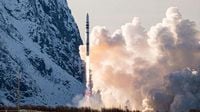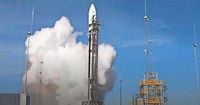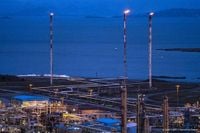In a significant yet challenging moment for European space exploration, Isar Aerospace's inaugural launch of its Spectrum rocket from Norway ended in failure on March 30, 2025. The rocket, which was intended to be the first of its kind launched from the European mainland into orbit, deviated from its trajectory just seconds after liftoff, resulting in a loud explosion as it crashed back to Earth.
The Spectrum rocket, measuring 28 meters in length and 2 meters in diameter, was launched from the snowy Andøya Spaceport in northern Norway. Initially, the launch appeared promising, but shortly after takeoff, the rocket began to wobble and ultimately fell back to the ground, leading to its destruction.
Despite the failure, Isar Aerospace, a German start-up, referred to the test flight as a success of sorts. "With this test flight, we are able to gather valuable data for future flights," the company stated on social media platform X. CEO Daniel Meltzer had previously noted that achieving just 30 seconds of flight would be considered a significant accomplishment, emphasizing the importance of each second in collecting data and gaining experience.
The mission, dubbed "Going Full Spectrum," is part of Isar Aerospace's broader ambition to launch small and medium-sized satellites into orbit. The company has already begun producing its second and third rockets, signaling its commitment to advancing its space capabilities despite the setback.
Isar Aerospace is notably the first company to attempt such a launch using entirely private funding. The rocket's engines incorporated innovative technologies, including components made with 3D printing, allowing for rapid modifications. The fuel used for the Spectrum rocket consists of liquid oxygen and propane, further showcasing modern advancements in rocket technology.
Juliana Metzler, a spokesperson for Isar Aerospace, highlighted the mission's significance for future generations, stating, "This is important for GPS, communication, internet, but also for predicting storms, floods, and wildfires, saving lives and nature." The choice of Andøya as the launch site was strategic, as it minimizes risks to populated areas during launches.
Interest in the Spectrum rocket's capabilities has been expressed by several countries, including Sweden and Great Britain, who view it as a viable alternative to commercial launches from the United States, such as those conducted by SpaceX. Isar Aerospace's efforts also place it in competition with established players like the French ArianeGroup, which launches rockets from French Guiana.
The failed launch marks a notable moment in the race for European space exploration. Other companies, such as Rocket Factory Augsburg and PLD Space from Spain, are also vying to establish themselves as key players in this burgeoning sector. The European Space Agency (ESA) typically utilizes launch bases in French Guiana and Cape Canaveral, Florida, making the development of independent European launch capabilities increasingly critical.
The Spectrum rocket's test flight had initially been scheduled for earlier in the week but faced multiple delays due to adverse weather conditions. This underscores the challenges faced by aerospace companies in launching rockets, particularly in the unpredictable climate of Norway.
This attempt to launch a rocket from the European mainland follows a previous effort by Virgin Orbit in early 2023, which also ended in failure and resulted in the company's bankruptcy. Unlike Isar Aerospace, Virgin Orbit employed a unique method, launching its rocket from a modified Boeing 747, which ultimately proved unsuccessful.
As Isar Aerospace prepares for its next steps, the company remains optimistic about future launches. "Rocket #2 and #3 are already in production. Isar Aerospace is preparing for the next launch," they announced, indicating a resilient approach to overcoming this setback.
In summary, while the initial launch of the Spectrum rocket did not achieve its intended goal of reaching orbit, it provided critical data and experience that could pave the way for future successes in European space exploration. As the industry evolves, the commitment of companies like Isar Aerospace to innovate and push boundaries will be vital in establishing a robust and independent European space launch capability.



